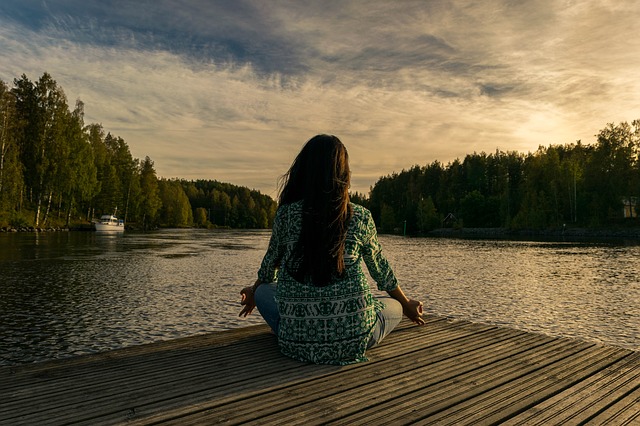Do you find it stressful to relax? Sometimes, people make things worse by relaxing at a bar on the way home or indulging in some other habit with negative side effects. You deserve some time to yourself. Relaxation is a habit worth picking up. It’s good for you in every way. Today we’re going to look at relaxing at home after a long day.

As Barton Goldsmith, PhD wrote for Psychology Today, “It doesn’t matter what form your idle time takes, as long as it’s not destructive. You owe yourself the gift of a deep breath and a view of the long sunset. And if you tell yourself that you’re being unproductive, remember that you can’t function well if you’ve exhausted all your resources by never stopping to take a rest.”
6 Simple Steps To Relaxing At Home After A Long Day
Why bother?
- At the end of a long day, you should notice what it’s doing to your body. Commuting, work, performance, co-workers, and bosses wear you down physically. If you work or parent from home, you still have the stress of schedules, children, appointments, and much more.
- The stresses may raise your blood pressure, trigger migraines, cause ulcers, and other physical symptoms. They can accumulate building into autoimmune conditions with lasting effects. Relaxing at home is necessary if you want to rejuvenate and restore your energy.
- A long day plays havoc with your nervous system. You may not notice at the time, but work consumes the neurons that keep your thinking sharp and balanced. And, when the nervous system is vulnerable, it opens itself to anxiety, depression, and related syndromes.
- Your head gets cluttered, your analytical and strategic abilities cloud up, and your creative and/or organisational skills weaken. You’ll find yourself making poor decisions, irritable, and increasingly overwhelmed.
Mood swings
- Mood swings will complicate your day. But the stresses of a long day can disrupt your hormonal balance to empower uncomfortable and unwelcome mood changes. These imbalances may be a function of age and gender, but stress does not better the situation.
- Some days are worse than others, but without a pattern of relaxation to offset the stresses, you will struggle to sustain some level of calm and focus to handle new events, tasks, or social interactions. You just won’t be operating on all pistons.
- Work can be fun, again. With constructive relaxation in your system, you are better able to bring full energy to your work. You will be more awake, more energized, and more adept. Your eyesight improves, your muscle memory returns, and your project management pays off.
- Moreover, relaxing at home will help you make something of those stupid meetings, handle the kids’ tantrums easily, and stand up to your boss. It even provides added strength when you are fighting a cold or worried about the children.
- Relaxation makes you a better person. When you are relaxed, you lead others around you. The more comfortable you are with yourself, the happier others will find you. They will enjoy your company more, pay attention to you at meetings, and follow your lead because of your calm and equanimity.
Conversely, the stressful outcomes of little or no relaxation will spoil things for others. It spreads to affect moods, emotions, and attitudes in those around you. So, if you have the energy to relax, you may need some information.
Step-by-step guide:
1. Eat, sleep, and pray
It’s easier to relax if respect your diet. Things are easier for the brain and body if you eat nutritiously. Eating a good breakfast starts a good day and frequent, healthy, mini snacks will sustain your systems until you are ready to unwind. So, avoid caffeine, alcohol, and tobacco, and opt for clear water and chamomile tea.

Short naps at home or work provide several benefits. They take you out of the grind, relax brain and body, and restore vital systems. But you should avoid anything that might interfere with sound sleep at night.
Prayer takes many forms. It might be yoga sessions, spiritual readings, or meaningful meditation. Any words or rituals that evoke inner peace are gateways to meaningful relaxation.
2. Practice, practice, practice
As with most things, practice makes things work better and easier. So, when you find what works for you, you should repeat it until it becomes an effortless habit. For example, the dog needs a walk and you need a walk. Taking a familiar route benefits both of you.
The walk invigorates your systems without really taxing them. If the walk takes you through natural surroundings, it will relax. But it will also reduce your stress if the walk takes you through a neighbourhood to stop and chat with friends.
Maybe playing the piano or guitar is more of your pleasure. Music will calm the most savage beast in you, but you should make it a habit to practice each day for the same length of time at the same hour. Trying to play a new tune will distract your attention from your daily worries.
3. Talk it over
You can diffuse the stresses by sharing them with others. You can call or text a friend and confidante to pass your burdens on to them. But if it’s not likely you to moan and whine about your day, you should make a constructive conversation out of the problems. You might tell your friend, “Here’s what happened to me today.” Then, ask the friend what s/he would do. Tell them how you handled the problem, and ask what they think of your action.
Such conversations have at least three benefits. First, talking it over reduces your psychological and emotional tension by moving it off your shoulders and outside of your head. Second, listening to yourself will offer a new perspective on the size and intensity of the problem. And, third, if you listen more than talk, you may get some good advice from people you love and respect.

Writing everything down is another way of getting everything out. Keeping a journal is often recommended by psychologists as a way of sharing the thoughts that trouble you as well as those that warm your heart. The point is the exercise transfers your tension to another platform. You can do this on your phone, computer, or journal book at the moment you feel the tension, or you can do it as thoughts strike you. Putting things down on paper and looking at them later reduces their negative impact.
4. Make an investment
There are benefits to spending some money on relaxing at home tools. For instance, there are many CDs and Podcasts geared to relaxing with selected music, guidance, or readings. People find listening to packaged sounds like rain, ocean, or whale sounds work for them. And, some people need only ten minutes with a favourite playlist to wash away their tension.
Others collapse into their personal bean bag sofa to read, watch a little TV, listen to music, or snooze. The only problem they have is keeping the kids and pets off their special relaxing at home section. Just make sure your bean bag sofa is allergen-free, durable, long, and comfortable enough to fit the body.
5. Take a breath
Meaningful relaxation begins with a conscious change in your day. You deserve some time to yourself. One way to signal the brain and body to change their modus operandi is taking a few deep breaths.

In the bath, on the porch, in your den, or before bed, you can make deliberate attempts when relaxing at home. The deep breathing brings energy-building oxygen into your longs to enrich the blood. Because there is some effort involved, you turn off the negative thinking. Follow those deep breaths with some leg and arm stretches. Roll your shoulders and extend your jaw and neck muscles. The physical moves will break up the tension, cramps, and spasms.
A commitment to yoga or similar exercises will provide a personal mantra to subdue those chronic negative and intrusive thoughts of the day.
6. Have some fun
If you can commit even 10 minutes a day to something you enjoy to the core, it will restore your emotional balance. For some, that could mean relaxing at home is jumping on the backyard trampoline with the kids. Others enjoy coaching little league or volunteering services.

You can find relieving joy in helping the children with their homework, playing video games, or bowling once a week. Or, you might meet with your wine, book, or bridge club to get out of the house.
Your definitive guide:
Relaxing at home after a long day, you can simply mean you loosen your belt, take off your shoes, and open a beer. But according to the Mayo Clinic, “To get the most benefit, use relaxation techniques along with other positive coping methods, such as thinking positively, finding humour, problem-solving, managing time, exercising, getting enough sleep, and reaching out to supportive family and friends.”
You should put relaxation techniques on your calendar, follow some discipline, and stick with it. Conscious relaxation techniques will improve your physical and emotional health, restore your energy and potential at work and at home, and enhance your experience and perception by others.
